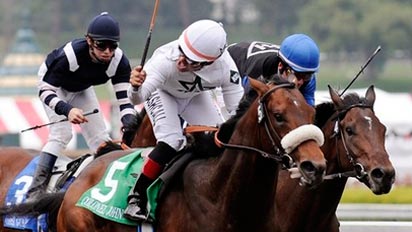
I've been wanting to write this post for awhile but was waiting until horse racing season began. As the coveted Kentucky Derby nears in early May, I thought having a post about the not so often talked about relationship between jockeys and eating disorders was needed.
I recently read a British study which looked at the differences in jockeys' weights and their psychological mental attitude and attitudes towards eating behaviors. This research found similar results along along with a 2002 New Zealand study
Essentially, as jockeys "waste," the term used when they try to get to the absolute minimum in order to ride, they have many similar characteristics to those with eating disorders both physically and mentally. This "wasting" may involve "a combination of starvation, deliberate dehydration, excessive sauna use, and self-induced vomiting, known colloquially as flipping. The majority of jockeys battle with their weight at some point in their career." Many develop osteopenia and dehydration as well as lack micronutrients which their bodies need. Psychologically, the jockeys have mood swings, depression, and develop negative attitudes toward food.
In two other articles which quoted the same study, the attitude that this has happened and continues to be reinforced doesn't seem to really matter. In the British article which talked to jockeys at the Cheltham Festival, the jockeys said they didn't see anyone who had an eating disorder. They only claimed they were strict with their weight and that these type of slimming down behaviors were all "part and parcel" for the sport they loved. In an Irish paper, the chief executive of the Professional Jockey Association said he didn't believe there was any kind of eating disorder in horseracing and that this data was at least five years old. The British article can be read here, and the Irish one here.
I think this in and of itself presents a PROBLEM. The fact is that the weight guideline for jockeys is archaic. They have not changed much since the18th century when men were shorter and smaller. According to the film, Jockey, a 2004 HBO documentary, there were some weight guidelines being changed at various tracks. Still though, I don't really think this issue is taken very seriously despite the fact that several jockeys have died, needed organ transplants, developed alcoholism, and other health problems.
Besides the physical toll on jockeys' bodies, there is also a lot of politics as well. Jockeys do not get paid much per race unless they are the winning rider. It's a difficult way to live, and it does explain why some of these riders resort to these methods for weight loss. Winning, in this sport, seems to mean sacrifice, even at the cost of one's health. I hope more guidelines will be changed. Some have said that having larger riders could be more harmful to the horses. Quite honestly, I think the horses can learn to adjust more than we give them credit for.
Another interesting article about horse racing and jockeys is this one. It sheds light into the dark part of the sport.
No comments:
Post a Comment